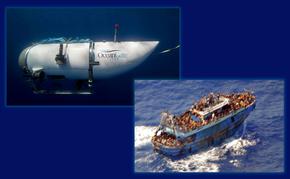The views expressed in our content reflect individual perspectives and do not represent the authoritative views of the Baha'i Faith.
Identity politics has become a strong force in contemporary society. But few people really understand the phrase “identity politics” or how it got started—so let’s explore it.
Nobody claims to know for sure who used the phrase first, but it seems to have its roots in the 1960s and ‘70s, when psychologists like Erik Erikson began focusing on individual identity, writing books like Dimensions of a New Identity and Identity, Youth and Crisis. Those books and many more inspired movements away from a collectivized society, toward a society grounded primarily in more specific groupings having to do with ethnicity, race, citizenship, culture, gender and religion.
Erikson and other psychiatrists and thinkers, along with Pulitzer Prize-winning authors and historians like Arthur Schlesinger, managed to name a new social trend: one that abandons assimilation, celebrates differences, advances multiculturalism and raises the awareness and the practice of making humankind a collection of very separate individual identities. Rather than the old idea of submerging all individual identities in a “melting pot,” they pointed out, identity politics asks us to emphasize cultural differences, or even revert to tribalism instead of trusting in a larger, more inclusive society:
Tribal identification is, perhaps, the first and most basic manifestation of a human devaluation window: If you are not of my tribe, you’re not like me and probably are inferior to me. I don’t trust you, and I am wary of your peaceful intent. Therefore, I can exclude you from my family of humans. This tribal differentiation enables cloudy or closed worldview windows that, in many cases, is benign but, as in the case of the Hitler and the Nazis, can cause great harm and devastation. – John Opincar, Ethical Intelligence for a New Millennium, 14 August 2016.
This tribal movement toward identity politics gained momentum with the increasing scholarly and popular attention on the foibles and failings of Western civilization. Although it was admired for ages as the pinnacle of societal development, many have now realized that European culture—with its vicious colonialism, its warmongering aggression, and its historic levels of enslavement, prejudice and racism—has a very ugly past.
Baha’u’llah, the prophet and founder of the Baha’i Faith, put it this way:
The civilization, so often vaunted by the learned exponents of arts and sciences, will, if allowed to overleap the bounds of moderation, bring great evil upon men. Thus warneth you He Who is the All-Knowing. If carried to excess, civilization will prove as prolific a source of evil as it had been of goodness when kept within the restraints of moderation. – Gleanings from the Writings of Baha’u’llah, pp. 342-343.
Abdu’l-Baha, Baha’u’llah’s son and the head of the Baha’i Faith after its founder’s passing, wrote this in 1875, before the two ensuing world wars that convulsed the European continent:
The peoples of Europe have not advanced to the higher planes of moral civilization, as their opinions and behavior clearly demonstrate. Notice, for example, how the supreme desire of European governments and peoples today is to conquer and crush one another, and how, while harboring the greatest secret repulsion, they spend their time exchanging expressions of neighborly affection, friendship and harmony.
Be just: can this nominal civilization, unsupported by a genuine civilization of character, bring about the peace and well-being of the people or win the good pleasure of God? Does it not, rather, connote the destruction of man’s estate and pull down the pillars of happiness and peace? – Abdu’l-Baha, The Secret of Divine Civilization, pp. 60-61.
So, some observers have asked, how can we not revert to tribalism? If nationalism hasn’t worked, if so-called “Western values” have lead us into brutal forms of savagery, only provoking colonialism, genocide and war, shouldn’t we go back to our regional, tribal, racial and religious groups?
When asked what he thought about Western civilization, Mahatma Gandhi famously and maybe apocryphally said “I think it would be a very good idea.”
But what else is there? If we live in modern societies with contemporary values, how can we replace that culture? Can we retreat to the safe, familiar associations of the past?
No, the Baha’i teachings say. Instead, Baha’is believe, we must jettison the old patterns, groups and boundaries, and become world citizens, lovers of all humanity, able to transcend all differences and barriers that exist between people:
O contending peoples and kindreds of the earth! Set your faces towards unity, and let the radiance of its light shine upon you. Gather ye together, and for the sake of God resolve to root out whatever is the source of contention amongst you. Then will the effulgence of the world’s great Luminary envelop the whole earth, and its inhabitants become the citizens of one city, and the occupants of one and the same throne. – Baha’u’llah, Gleanings from the Writings of Baha’u’llah, p. 217.
It is not for him to pride himself who loveth his own country, but rather for him who loveth the whole world. The earth is but one country, and mankind its citizens. – Ibid., p. 250.
God has created the world as one—the boundaries are marked out by man. God has not divided the lands, but each man has his house and meadow; horses and dogs do not divide the fields into parts. That is why Baha’u’llah says: “Let not a man glory in that he loves his country, but that he loves his kind.” All are of one family, one race; all are human beings. Differences as to the partition of lands should not be the cause of separation among the people.
One of the great reasons of separation is colour. Look how this prejudice has power in America, for instance. See how they hate one another! Animals do not quarrel because of their colour! Surely man who is so much higher in creation, should not be lower than the animals. Think over this. What ignorance exists! White doves do not quarrel with blue doves because of their colour, but white men fight with dark-coloured men. This racial prejudice is the worst of all. – Abdu’l-Baha, Abdu’l-Baha in London, p. 55.

















Comments
Sign in or create an account
Continue with Facebookor